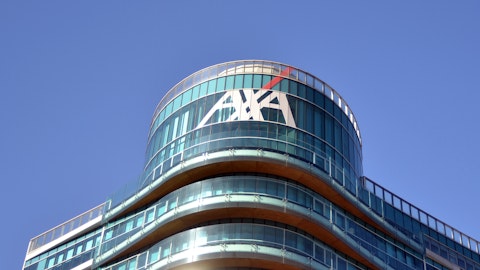Bill Demchak: Look, you wouldn’t purposely borrow wholesale and then invest in a security to hold in your securities book. However, inside of all the requirements that we manage ourselves to, we also have liquidity requirements, LCR and the need to hold high-quality liquid assets. So, the securities book will likely fade in terms of total percentage over time simply because of loan growth that we see in some of the roll down. That securities book is part of what we have in terms of cash and liquidity to satisfy LCR. So it’s — we’re not going to say, “Hey, let’s borrow some money to buy more treasuries,” right? That isn’t going to happen. But practically, we use that book to hedge the value of our deposits. We’ll continue to do that, and we’ll continue to do that inside of the lens of LCR and other liquidity stresses that we run.
Operator: Our next question is from the line of Mike Mayo with Wells Fargo Securities. Please go ahead.
Mike Mayo: Well, I guess in the category of no good deed goes unpunished, I mean you did have positive operating leverage last year of 300 basis points. You’re guiding for positive operating leverage this year between I guess, 200 and 600 basis points, your charge-offs were below 30 basis points every quarter. You’re buying back some shares yet, your guidance from one month ago was off and your results fell 1.8 below consensus. Now don’t stop giving your guidance or anything like that and were all subject to the uncertainties out there. But just a little bit more about what’s changed in the past month. So I guess, unemployment, your end rate assumption, you’re saying it’s over 5%, maybe where that’s going to. And I guess that drove some of the CECL-driven reserve part of reserves, the NII and maybe your decision to lean into the securities purchases maybe because you think this is a relative top on yields?
Bill Demchak: Yes. So, you’re overcomplicating it. One thing changed from a month ago and one thing only. And that was basically the spread we thought we’d earn on new business, right? We know, Mike, that we can go out and grow loans. Our ability to gain clients, cross-sell those clients, we’ve never been more bullish on that. The process of doing that is not earning what we would otherwise expect in the moment because spreads have not widened and, of course, you take a full life of the loan reserve when you book that loan. That’s the only thing that’s really changed. The expenses this quarter are noise. The guide for next year is tempered simply by that question of whether spreads are going to rise on loans, maybe they will or our CECL analysis will be wrong.
We haven’t we never guide on what our provision is going to be. We talk about charge-offs and the charge-off this quarter we felt was a bit anomalous. So nothing’s really changed other than the sweat factor of, hey, can I actually earn what I thought I was going to earn on new loan production. That’s it.
Mike Mayo: So you’re saying you’re too conservative either on CECL reserves or your NII guide for the year? And.
Bill Demchak: Well, but I haven’t given you a number on my CECL reserves — right? So — but we put in — we worsened our economic forecast. And the simple sound bite is either spreads are going to widen or our economic forecast is wrong. I think that’s a fair statement.
Rob Reilly: So, there’s an inconsistent.
Mike Mayo: You give — by the way, the CEO gauge turn out maybe to come to the economists because this is such a detailed outlook in your release about what you expect the economy and interest rates and everything else. So you give a lot of detail.





